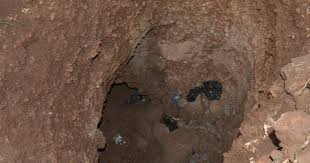

Dozens of people are killed annually at gold mine sites in a worrying trend.
The latest happened in Homa Bay on February 10 where four miners were killed after venturing into a 900-foot deep hole for gold deposits.
The incidents have prompted the government to establish a special unit to focus on the activities at the sites.
Most of the victims are low-income-earning people trying to feed families.
The Mining Police Unit is among others supposed to ensure those managing the sites adhere to safety rules for the miners and other users.
The Mining Police Unit is mandated to pursue miners, prospectors, and dealers violating the industry law and regulations.
Some of these accidents have been attributed to the unsafe use of heavy machines to crush stones in artisanal activities, overlooking the environmental impact.
The machineries make the sites weak and unsafe for the miners, according to officials.
Others say lack of protective gear for the miners when they venture in there exposes them to the dangers.
They are supposed to carry among others oxygen cylinders for use while scavenging for minerals.
The miners also at times use weak materials in their mission, which collapse in the process leading to the deaths.
Most of the gold mine sites have been found to be unsafe.
Some of them are also not licensed.
The government had in 2024 banned unlicenced commercial mining.
“To ensure regularised artisanal mining that meets public safety and environmental standards, the government has banned all artisanal mining activities as well as unlicenced commercial mining,” said then-interior Cabinet Secretary Kithure Kindiki.
But the miners don’t hear any of that as they usually venture to the sites for a living.
Legal artisanal and small-scale mining contributed at least Sh30 billion to the economy in 2023, representing over half of the country's mining output.
To deal with some of these challenges, the government has also directed those involved in mining activities to stop operations for the National Environmental Management Authority (NEMA) to conduct an environmental impact assessment to give the ecological guidelines before mining operations can resume.
Apart from Homabay, there are gold deposits in Kakamega, Vihiga, Migori, West Pokot, Moyale in Marsabit, Isiolo, Transmara and Nandi.
Kenya's mineral deposits include gold, copper, silver, lead, talc, titanium manganese zine nickel,
A series of progressive reforms were instituted to streamline the sector, including shutting down 3,000 illegal entities, conducting a countrywide mineral geo-survey, establishing a formula for sharing earnings and declaring mineral smuggling an economic crime.










